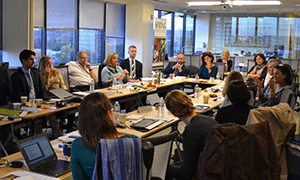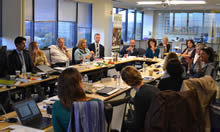
It is widely accepted that improving nutrition outcomes relies on sufficient financial resources to scale up and support high-quality nutrition-specific and nutrition-sensitive programming. However, measurement, analysis, and monitoring of financial resources for nutrition is a complex process. The 2014 Global Nutrition Report emphasized the importance of countries being able to track and monitor their domestic nutrition spending, since this information has important implications for policymaking, planning, budget monitoring, and advocacy.
As of 2015, 30 countries were able to report preliminary estimates of the proportion of national budget that is dedicated to nutrition in the Global Nutrition Report. Of these, 16 conducted the data gathering activity by themselves; 10 were supported by the Global Nutrition Report (GNR) secretariat; two by the Results for Development Institute (R4D); and two by SPRING. During a series of regional budget analysis workshops in 2015 that were supported by UNICEF on behalf of the UN Network for the SUN Movement, it was found that the countries conducting nutritional financial analysis used very different methods of data collection and analysis. The countries involved in the workshops requested technical support to standardize the terminology and methodology to improve the quality and comparability of nutrition financial data.
| Objectives of the Technical Consultation on Nutrition |
|---|
| 1. Facilitate global information sharing on budget analysis and expenditure tracking to estimate government investments on nutrition. |
2. Harmonize technical assistance/guidance for tracking nutrition budget allocations and expenditures related to—
|
| 3. Discuss guidelines and tools for governments (policy makers and technical advisers), donors, and researchers responsible for analyzing nutrition financing. |
| 4. Discuss policy implications and coordinated actions for this work. |
Technical Consultation
Recognizing the important role of financial analysis for nutrition, SPRING partnered with the SUN Movement, R4D, and MQSUN to organize a technical consultation to harmonize guidance for researchers and countries wishing to conduct a nutrition financial analysis (additional objectives in the table above).
The consultation consisted of three meetings, attended by experts in nutrition financial analysis and representatives from countries that have undertaken nutrition budgeting and expenditure tracking.
Meeting #1
The first meeting was held in conjunction with the SUN Global Gathering in October 2015 in Milan, Italy. Meeting attendees included representatives from SPRING, SUN, R4D, Save the Children (UK), OPM, ACF, AIR, and WB (see annex 1). In this is one-hour session, the 13 participants—
- agreed to conduct two more meetings in the consultation series
- began to develop the concept note for the series
- began to define topic areas and parameters for global harmonization.
Meeting #2
The second meeting was held at SPRING’s headquarters in Washington, DC, in November 2015. This two-day meeting included participants at the October meeting and others working directly on nutrition costing and financing estimation. The 22 participants included representatives from SPRING, SUN, R4D, Save the Children (UK), OPM, AIR, USAID, and the World Bank (see annex 1).
The meeting began with a stock-taking of relevant data on nutrition financial analysis. Participants discussed the current work in Nepal and Uganda, where SPRING is conducting Pathways to Better Nutrition case studies; several countries that have used SUN’s three-step approach to budget analysis; countries with live nutrition monitoring systems such as Guatemala and Peru; Save the Children case study countries of Malawi and Zambia;, the World Health Organization’s efforts to analyze national health accounts data; and Results for Development’s case study in Rajasthan.
Meeting participants discussed differences in the nutrition data collection and analysis methods currently employed by the various practitioners. They agreed that some variation across countries and projects is acceptable; but that certain areas (discussed below), require consensus. In addition, important questions about whether current financial analysis data can or should be compared on a global level, and whether it will be possible to formulate a comprehensive set of guidelines for this work, were posed.
Key topics discussed at this meeting were—
- disaggregating data for integrated line items
- identifying and categorizing nutrition-sensitive programs
- weighting nutrition-sensitive programs
- tracking personnel costs
- communication of budget estimates for policy impact
- harmonizing government budget data with external sources
- tracking nutrition budget allocation and expenditures at a sub-national level.
Participants met in small groups to work through these and other key issues, identify areas of consensus or contention, and formulate initial recommendations on topics such as as minimum quality data standards, terminology, and balancing country and global nutrition financial analysis priorities. The results of these breakout sessions were reported to the full group in a plenary discussion toward the end of the meeting.
Amanda Pomeroy-Stevens drafted a slide deck that summarizes group consensus on the key questions, provides guidance to improve nutrition financial analysis, and describes outstanding issues with harmonization (annex 2). The organizers of the technical consultation series reviewed and approved the slide deck.
Meeting #3
The Technical Consultation Series culminated in a February 2016 meeting at R4D’s headquarters. At this meeting, participants presented findings to regional stakeholders, donors, and UN representatives. The 32 participants included representatives from SPRING, SUN, R4D, Save the Children (UK), OPM, AIR, WB, UNICEF, FANTA, FHI 360, PATH, Development Gateway, USAID, FAO, ICF International, Action Against Hunger UK, and Guthrie Consulting (see annex 1).
The day-long meeting began with a review of the consultation series process and the outcomes of the first two meetings in October and November. After Ms. Pomeroy-Stevens presented the aforementioned slide deck, participants talked about how budget analysis and expenditure tracking information from India, Ethiopia, Uganda, Nepal, and Malawi could influence nutrition policy and programming within countries.
This technical consultation series should move the topic of nutrition financing forward by providing answers to key challenges with estimating and tracking nutrition budget and expenditures. Findings from this series are informing the current round of technical consultations by SUN as countries continue to collect and refine these data.
Key Outcomes/Products
- Powerpoint summarizing group consensus on key question areas, which can guide future SUN budget workshops and other technical assistance on budgeting and expenditure (annex 2).
- SPRING news item (annex 3, published online November 2015).
- Panel describing the consultation, to be published in the 2016 Global Nutrition Report.
To view the annexes, please download the full report above.
